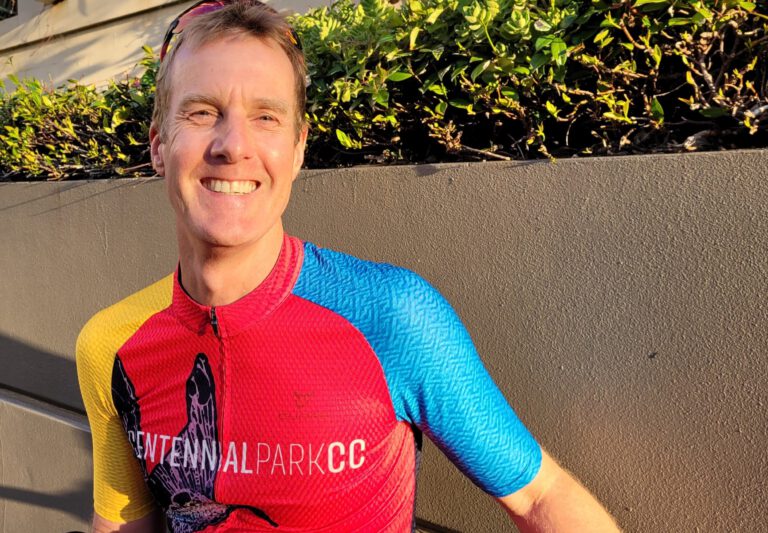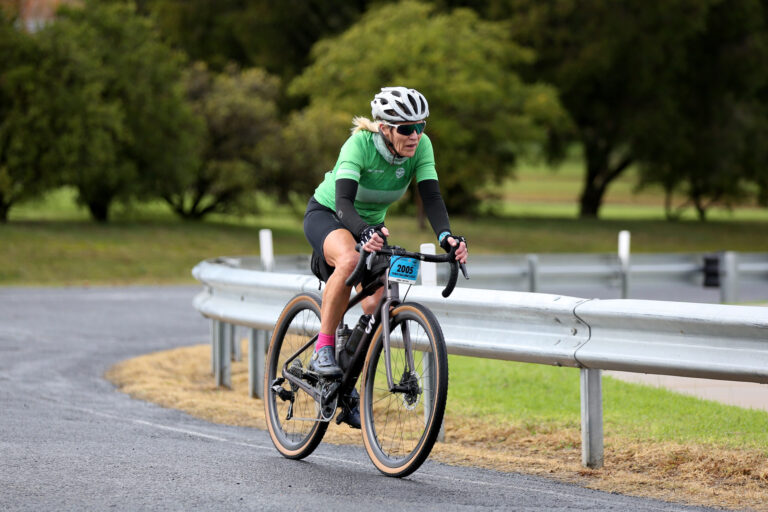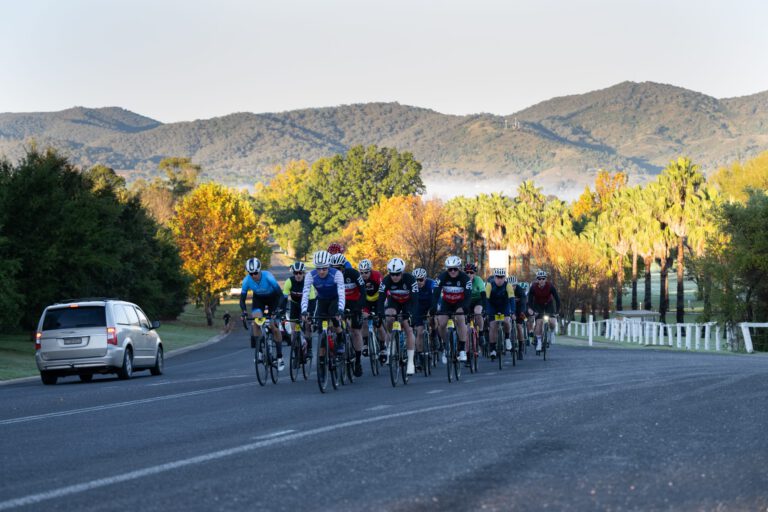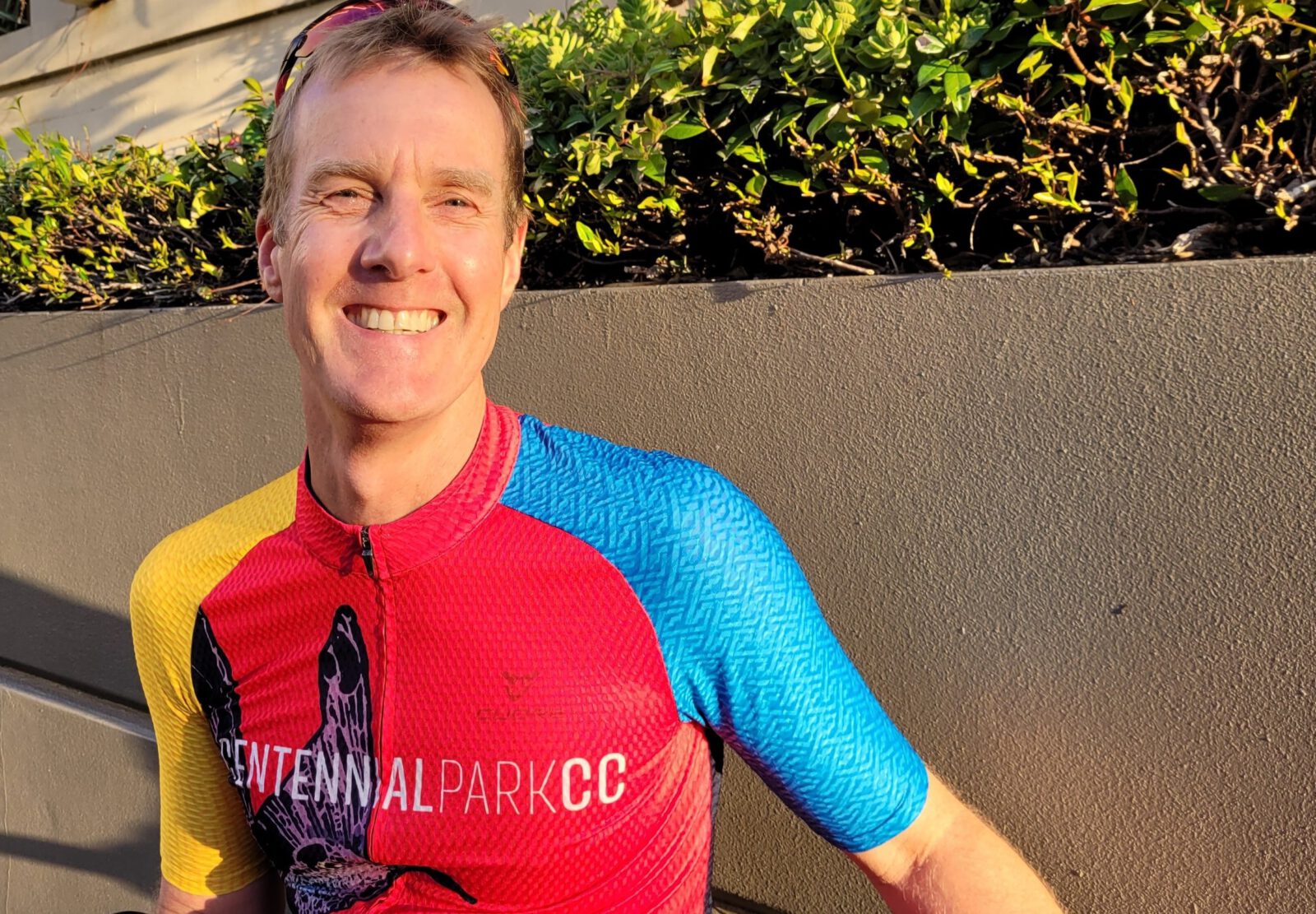
Geoff Nash from CoLab Coaching.
With just over 12 weeks until event day, we caught up with Geoff Nash from Colab Coaching to get his insights on how to train, fuel, and pace yourself for a successful and enjoyable ride at the Mudgee Classic.
Don’t forget the Mudgee Classic 12-week training plan starts from 10 February. You can download your free copy for the 170km Maxi and 120km Challenge courses HERE.
MC: What are the biggest challenges riders face during a long-distance cycling event, and how can they overcome them?
Geoff: To me, completing a ride successfully means enjoying your day and crossing the line with a smile on your face, rather than suffering throughout and dragging yourself to the finish. Pushing your limits because you choose to is great. Being at your limit just to finish is not so great.
So, what does that look like in practice? I think there are four key components that I would place under the banner of “good ride management”:
– Pace Yourself: Start conservatively to maintain energy for later in the ride. Effort, not speed, should guide your pacing.
– Ride in a Group: Riding solo is tougher both physically and mentally. Find a comfortable group and work together.
– Fuel Regularly: Eat and drink small amounts every 15-20 minutes to maintain energy levels.
– Break the Ride into Sections: Use rest stops as milestones to mentally divide the ride into manageable chunks.
MC: What is your advice for first-time participants who may be nervous about completing their ride?
Geoff: Rather than thinking about riding the whole distance, break it into chunks. The rest stops at the Mudgee Classic are perfectly placed for you to break your ride into doable sections. All you need to do is ride from one rest stop to another and then onto the finish. Can you ride 4 sections of 30kms? Sure you can.
The other great confidence booster is training. Nothing beats completing some long rides and practicing your ride management.
 MC: How important is nutrition during training, and what should riders focus on eating before, during, and after rides?
MC: How important is nutrition during training, and what should riders focus on eating before, during, and after rides?
Geoff: This is a whole topic on its own, so this is only very general advice. Performance, nutrition and recovery are linked. If your nutrition is poor, your performance and your recovery will be compromised.
– Before: A simple carbohydrate-rich meal (banana, toast, or fruit juice) fuels longer rides. Caffeine can also help performance.
– During: Consume at least 0.5g of carbs per kg of body weight per hour. Use a mix of sports nutrition and real foods to keep it enjoyable.
– After: Replenish with balanced meals including protein, complex carbs, and veggies.
This is very general advice on a very big topic. If you would like to know more my friend and Sports Nutritionist, Dr Gemma Sampson has some great, practical videos on YouTube. Gemma also has a podcast called “Fuelled”. She is an Aussie who works with World Tour professional teams and riders. I like her straightforward, commonsense approach that’s backed up by a wealth of knowledge. Check her out.
MC: What should riders focus on the week before the event? Is there anything they should avoid?
Geoff: If you have trained consistently your final week should be relatively light. You have done the work and now it is about being fresh for the event. That doesn’t mean you stop training. Like the training plan, volume drops in the last week but you still need a little bit of intensity to keep your engine revving.
The main thing to avoid is trying to cram in last minute “fitness”. It doesn’t work like that. All you’re going to do is make yourself more fatigued. This is where training consistently pays off. The last week before an event becomes your time to freshen up and hit the line fit and ready to go. It’s also helpful to avoid getting sick or crashing! Definitely try to avoid these.
MC: What’s the best strategy for pacing yourself during a ride as long as the 170km Maxi Classic?
Geoff: Pacing is something that you should practice during training. This means tapping into your effort level by being aware of your breathing and your intensity (legs and lungs). Note this is all about effort and feel, not speed. Speed is a poor indicator of intensity.
The ability to maintain focus and stay engaged over 170km is not easy, but it is important. I encourage my athletes to stay focused by regularly asking themselves these key questions. “Am I going too hard?” “Am I going too easy?” “Can I maintain this effort?” “Do I need to eat and drink?” These are fundamental questions that rely on no technology. You don’t need a heart rate monitor or a power meter so anyone can do it. Monitor your effort and keep asking yourself questions.
If you do have a heart rate monitor and/or power meter, then knowing some basic metrics and limits is a huge advantage. Knowing you can easily sustain 200W allows you to find the right group. Knowing you can hold 250W for a little while but 300W spells trouble is also great for climbs or shorter, harder efforts. The same goes for heart rate. Knowing you can sustain 150bpm for several hours, but the clock is ticking at 170bpm, helps you measure your effort. Simply put, knowing your endurance limit and your hard effort limit gives you a pacing “window” or range in which to ride. Stay in your window, eat and drink and you’ll do great.
Another key factor is knowing the course. Pushing hard up a climb because you know it is followed by a long flat section is different to pushing up a climb and then discovering it is followed quickly by 3 more. Study the course and know where the main climbs and rest stops are.
 MC: What’s the most important piece of advice you’d give to anyone participating in the Mudgee Classic?
MC: What’s the most important piece of advice you’d give to anyone participating in the Mudgee Classic?
Geoff: Train consistently.
Think of your training like learning a musical instrument. Practicing a little bit often is a lot better than 4 hours once a week. To improve, you have to do the basic stuff like learn scales, but it’s also great to play songs and jam with your friends. Both have their place and one compliments the other. All work is no fun, and no fun is very hard to sustain. All fun is great, but not the best way to improve. The key is to find a balance between structured training and having fun that works for you.
I have said it before, “Slow and steady doesn’t get the headlines but it wins in the end.“ Challenge yourself and approach your training positively. Don’t be daunted. Practice good ride management early on and build slowly and steadily.
If you do this, you will have nothing to fear come event day and be able to enjoy and soak up the experience.
Download your free 12-week training plan for the 170km Maxi and 120km Challenge courses HERE.
